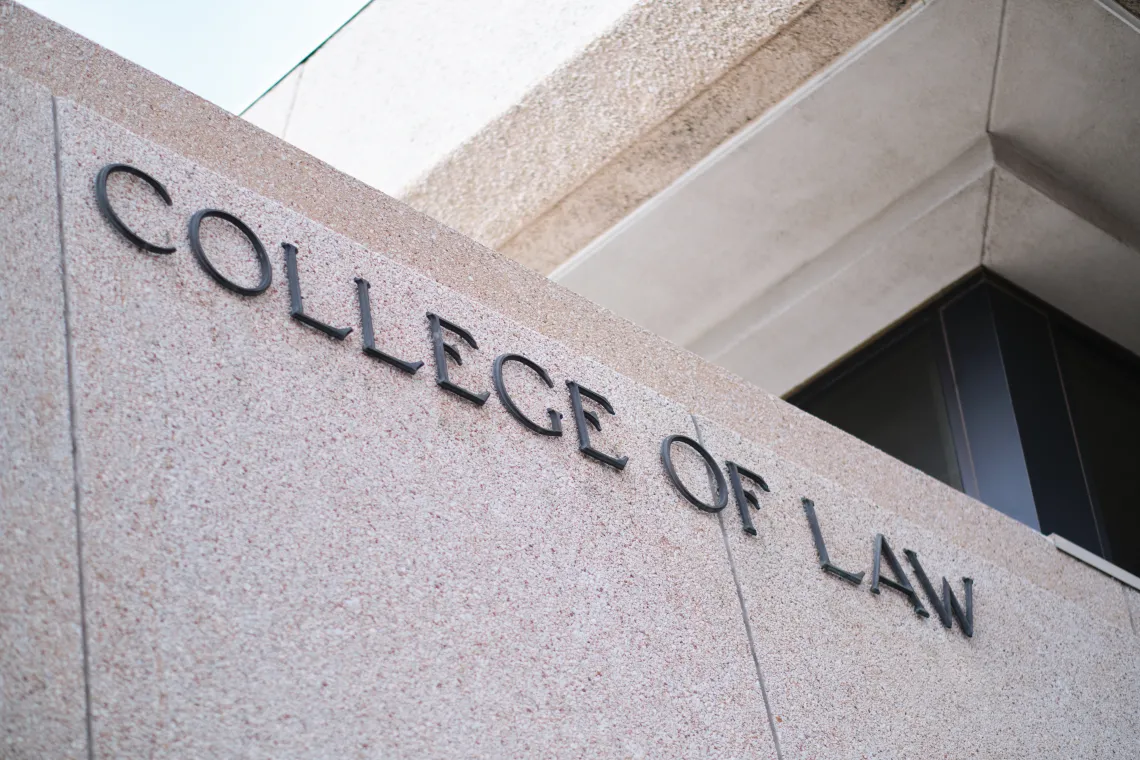University of Arizona Law Kicks Off Academic Year with Remarkable New Class
“You came here for different reasons and different aspirations, but today, you are all LawCats.”

The University of Arizona James E. Rogers College of Law welcomed new faces to campus this August – in Arizona, online and abroad – kicking off the college’s 108th academic year.
A diverse group, the combined JD and Advanced JD entering class includes 131 students representing 62 undergraduate institutions, 27 states, 8 Native Nations, and 8 countries.
Women make up half of the incoming class, and 28% are students of color, including 10 Indigenous students. This year’s entering JD class is also among the strongest academically in the college’s history with a median LSAT score of 163 and a median GPA of 3.79. And, thanks to the continued growth of the Navajo Law Fellowship Program, which offers support to Navajo students attending the college, this year’s JD class includes four students from the Navajo Nation. There are now nine total Navajo Law Fellows at Arizona Law.
The JD class is joined by more than 1,800 undergraduate students who are pursuing a BA in Law degree, the first undergraduate law program in the U.S. The group is part of the largest incoming first-year class in UArizona history – more than 9,300 students.
The reach of the BA program extends well beyond the U.S. borders. This fall there are 485 students working towards the BA in Law at Ocean University in Qingdao, China, 74 students studying for the BA at American University Phnom Penh and more than 80 students as part of the dual degree partnership between the College of Law and Hanoi Law University in Vietnam. Students in each of those programs will earn a BA in Law from the University of Arizona and a law degree from their home institution.
Graduate education at University of Arizona Law continued to expand this year, attracting students from around the world to advance their skills. The Masters of Laws (LLM) program welcomed six students to the General LLM and one to the International Trade and Business Law LLM. In addition, nine students joined the Indigenous Peoples Law and Policy (IPLP) LLM, including two Indigenous Māori students from New Zealand and one Native student who is Cherokee and Cree. Five new students also joined the Master of Professional Studies in Indigenous Governance program, representing four tribes; the Pascua Yaqui Tribe, San Carlos Apache, Mescalero Apache and Gila River Indian Community. And four new students also began working to obtain their Doctor of Juridical Science (SJD) from the IPLP program, with 3 Indigenous students, one hailing from the Maasai Indigenous community of Tanzania, one Indigenous student from the Endorois Indigenous community of Kenya, and another from the Igbo Indigenous community of Nigeria.
The college also welcomed a strong and diverse class of new Master of Legal Studies (MLS) students, admitting 165 – the largest incoming class in the program’s history. The vast majority of these students will be pursuing the degree online, while 24 will join us on main campus here in Tucson. Thirty-two members of the fall MLS cohort and nine from the summer cohort are participating in the Legal Paraprofessional (LP) concentration. Among them, 68% are women and 59% are students of color.
Graduate certificates in Health Law saw 20 new students admitted for the fall. With the inclusions of this semester’s new cohort, more than 275 students have pursued their certificate. In total, more than 1,500 students have enrolled in the Health Law & Policy program since its launch in 2019.
The new class of JD, AJD, MLS, MPS, LP, SJD and LLM students includes several first-generation Americans, a larger number of first-generation college students, and even more first-generation law students. Joining us with a broad range of professional and education background the class includes collegiate athletes, former journalists, musicians, a cattle breeder, a former talk radio host, a member of the Bobcat Senior Honorary and educators.
In speaking with a group of incoming students, College of Law Dean Marc L. Miller noted, “You came here for reasons as varied and personal as your fingerprints, but there are some common themes. You told us that you want to make a difference. You are committed to helping solve the world’s problems – in both little and large ways. You also told us that you imagine big things for yourselves, and your futures and we will be proud – but not surprised – when you accomplish them. You came to us for undergraduate and graduate degrees, JD degrees and post-JD degrees. You came here for different reasons and different aspirations, but today, you are all LawCats.”
